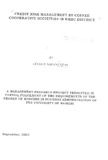| dc.description.abstract | Credit risk management involves the systems, procedures and controls which an
organization has in place to ensure the efficient collection of customer payments and
minimization of the risk of non-payment. (McMenamin, 1999).
This study was aimed at determining how coffee cooperative societies in Embu district
manage their credit risk.
The study was a census of all the twenty-four (24) coffee cooperative societies in Embu
district.
Primary data was collected by the use of a questionnaire. Data was analyzed using tables
and interpretations adduced thereto to find out credit risk management adopted.
The study found out that coffee cooperative societies in Embu district use only qualitative
methods in evaluating the creditworthiness of their members and none of these societies
use any of the quantitative methods. All the societies had credit policies but only eight
societies representing 33% had written credit manuals while the rest (67% ) had no
written credit manuals. All the societies (100%) did not have a credit committee separate
from the management committee and that the same committee which comprised of five
members acted in both capacities. A large pfoportion of these committee members were
semi-illiterate. The society secretary/manager was responsible for the credit risk
management with some assistance of one and in large societies two clerical officers.
Before a member is advanced credit, the following was scrutinized thoroughly; the
previous year's harvest, reputation of the borrowers and the amount of credit due.
The three major procedures used to follow credit defaulters include: personal visits, use
of letters and telephone calls and use of other coffee cooperative societies within the
neighbourhood where a member could have sold his coffee. These neighbours assist each other to recover the credit from their defaulters. None of the societies used the legal
action or the collective agencies to follow the defaulters.
Twenty (20) societies representing (83%) reported cases of reckless lending mainly due
to related parties lending.
As a major conclusion of the study therefore, there seems to be lack of professionalism in
some areas of credit risk management by coffee cooperative societies., namely insider
dealings, favouring related parties when lending, influence from outside forces. too much
reliance on reputation and lack of adequate knowledge on credit management. This calls
for the qualified personnel to be employed in credit management aspects considering the
importance of credit to the members. This would call for the government (probably
through the ministry of cooperative development and marketing) to continually train all
the societies managers in financial management other than training a few in procedures of
financial accounting only. The government should set minimum qualification for those
to be employed as society secretaries/managers and other permanent staff. | en |

